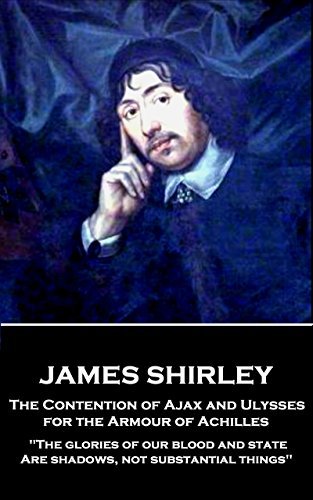What do you think?
Rate this book


49 pages, Kindle Edition
Published June 1, 2017
The glories of our blood and stateI’ve loved this little dirge ever since I first encountered it—adorned with the title of “Death the Leveller”—in Palgrave’s Golden Treasury over fifty years ago. Since the dramatist James Shirley was listed as its author, I assumed that it served a funereal function in one of his many plays, but I failed to encounter it in my reading of Shirley’s works. (And—trust me—I have read more than my share of Shirley). Finally, I decided to seek out its origins, and found that I was right …. well, almost right. And behind the need for that “almost” lies a tale.
Are shadows, not substantial things;
There is no armour against Fate;
Death lays his icy hand on kings:
Sceptre and Crown
Must tumble down,
And in the dust be equal made
With the poor crooked scythe and spade.
AJAX:
Great Jove, immure my heart, or girt it with
Some ribs of steel, lest it break through this flesh,
And with a flame contracted from just fury,
Set fire on all the world: How am I fallen?
How shrunk to nothing? my fame ravish'd from me?
That this sly talking Prince is made my Rival
In great Achilles Armour: Is it day?
And can a Cloud darker than night, so muffle
Your eyes, they cannot reach the Promontory,
Beneath which now the Grecian fleet rides safe,
Which I so late rescued from Trojan flames,
When Hector frightful, like a Globe of fire,
By his example taught the enraged youth
To brandish lightning; but I cannot talk,
Nor knows he how to fight, unless in the dark
With shadows. I confess, his eloquence
And tongue are mighty, but Pelides sword
And armour were not made things to be talk'd on,
But worn and us'd, and when you shall deter∣mine
My juster claim, it will be fame enough
For him, to boast, he strove with Ajax Telamon.
And lost the prize, due onely to my merit.
ULYSSES:
Wisemen joyn policy with force, the Lyon
Thus with the Fox, makes up the Souldiers emblem.
And now I look on Ajax Telamon,
I may compare him to some specious building,
His body holds vast rooms of entertainment,
And lower parts maintain the Offices,
Onely the Garret, his exalted head,
Useless for wise receipt, is fill'd with lumber,
A Mastiff dares attempt to combate Lyons,
And I'll finde men among your Mercenaries
Shall fly on Hydra's, if you name that valour:
But he, that we call valiant indeed,
Knows how, and when to fight, as well as bleed.